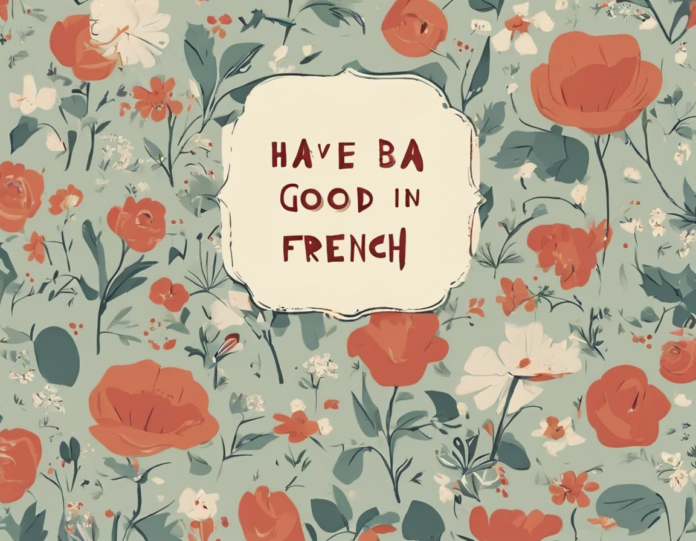Bonjour! Are you ready to embrace a beautiful day the French way? Learning how to say “have a good day” in French is not only a polite gesture, but it can also add a touch of elegance and sophistication to your daily interactions. Whether you want to impress your French-speaking friends, colleagues, or simply add a little je ne sais quoi to your language skills, mastering this simple phrase can go a long way.
In this comprehensive guide, we will explore the various ways to express well wishes in French, delve into the nuances of cultural etiquette, and provide you with practical tips to help you incorporate these expressions into your daily conversations. So, without further ado, let’s dive into the art of wishing someone a good day in French!
A Brief Overview of French Greetings
Before we dive into the specific phrase for wishing someone a good day in French, let’s take a moment to review some common French greetings that are typically used throughout the day:
1. Bonjour (bohn-zhoor) – Good morning / Hello
- This versatile greeting is used throughout the morning and afternoon until around 6:00 PM.
- It’s considered polite to greet someone with “bonjour” before engaging in a conversation.
2. Bonsoir (bohn-swahr) – Good evening
- Used in the late afternoon and evening as a greeting.
- Similar in usage to “bonjour,” but appropriate for later in the day.
3. Bonne nuit (bohn nwee) – Good night
- Used when parting ways in the evening or before going to bed.
- It’s a common way to wish someone a restful night.
Now that we’ve touched on some basic greetings, let’s move on to the main focus of our guide: expressing well wishes for a good day in French.
How to Say ‘Have a Good Day’ in French
The equivalent of “have a good day” in French is typically expressed as “bonne journée.” Let’s break down this expression and explore some variations that you can use to convey similar sentiments:
1. Bonne journée (bohn zhur nay) – Have a good day
- This is the standard and most commonly used way to wish someone a good day in French.
- It’s appropriate to use in both formal and informal settings.
2. Excellente journée (eks-seh-lahnt zhur nay) – Excellent day
- An elevated way to wish someone a particularly great day.
- Can be used to convey extra enthusiasm or sincerity.
3. Passez une bonne journée (pah-sayz oon bon zhur nay) – Have a good day
- A slightly more formal variation that includes the word “passez,” meaning “to have.”
- Suitable for professional or polite interactions.
4. Que votre journée soit agréable (kuh vo-truh zhur nay-twa swah ah-greh-ahbl) – May your day be pleasant
- A more poetic and formal way to express well wishes for someone’s day.
- Conveys a sense of courtesy and warmth.
5. Profitez bien de votre journée (pro-fee-tez byen de vo-truh zhur nay) – Enjoy your day
- Encourages the person to make the most of their day and have a good time.
- Conveys a friendly and positive sentiment.
Tips for Using French Well Wishes
Now that you have a better understanding of how to wish someone a good day in French, here are some tips to help you incorporate these expressions seamlessly into your conversations:
-
Be Mindful of the Time of Day: Use the appropriate greeting based on the time of day. For instance, “bonne journée” is typically used during the day, while “bonsoir” is more appropriate in the evening.
-
Consider the Context: Tailor your well wishes based on the formality of the situation. Use more formal expressions in professional settings and casual ones with friends and family.
-
Practice Pronunciation: Pay attention to the pronunciation of each phrase to ensure clear communication. Practice speaking these expressions aloud to become more comfortable using them.
-
Add a Personal Touch: Consider adding a personal touch by combining well wishes with a specific message, such as “bonne journée, mon ami” (have a good day, my friend) for a more personalized touch.
By incorporating these tips into your daily interactions, you’ll be well-equipped to greet others in French with warmth and courtesy.
Frequently Asked Questions (FAQs) About Saying ‘Have a Good Day’ in French
1. How do you respond to “bonne journée” in French?
If someone wishes you a good day by saying “bonne journée,” you can respond with “merci, à vous aussi” (thank you, you too) or “pareillement” (likewise).
2. Can you use “bonne soirée” to wish someone a good day?
While “bonne soirée” technically means “good evening,” it can be used as a friendly way to wish someone a good day if it’s already later in the afternoon.
3. Is it common to say “bon matin” in French?
While “bon matin” technically means “good morning,” it’s not commonly used in French. Stick to “bonjour” as a more versatile greeting throughout the morning.
4. Are there regional variations in how well wishes are expressed in French?
Different regions in France and Francophone countries may have variations in how well wishes are expressed, but the phrases covered in this guide are widely understood and used.
5. Can you wish someone a good day in French in a more casual way?
Yes, you can use informal expressions like “passe une bonne journée” in casual settings with friends or family members to convey well wishes in a relaxed manner.
6. How do you wish someone a good day in a more formal setting?
In more formal settings, you can use phrases like “passez une bonne journée” or “que votre journée soit agréable” to express well wishes with a touch of formality.
7. When is the appropriate time to use “excellente journée” in French?
“Excellente journée” can be used when you want to wish someone an exceptionally great day or convey extra enthusiasm and sincerity in your well wishes.
8. What is the difference between “bonne journée” and “profitez bien de votre journée” in French?
While both phrases express well wishes for a good day, “profitez bien de votre journée” specifically encourages the person to enjoy and make the most of their day, adding an extra layer of emphasis on enjoyment.
9. Can you use gestures or body language to accompany well wishes in French?
While not necessary, a smile, nod, or friendly hand gesture can enhance the sincerity of your well wishes when speaking in French, adding warmth to your interactions.
10. How can I practice incorporating French well wishes into my daily conversations?
Try integrating these phrases into your interactions with friends, colleagues, or even in everyday situations like shopping or dining. The more you use them, the more natural they will become in your conversations.
Remember, language is not just about words; it’s also about the connections and cultural understanding that we build through communication. By learning how to express well wishes in French, you’re not just mastering a phrase—you’re embracing a new way to connect with others and share positivity in your interactions.
So, go ahead and spread some joy and elegance by wishing someone a “bonne journée” or “excellente journée.” Embrace the beauty of language and culture, one well wish at a time. Bonne journée!


Recent comments